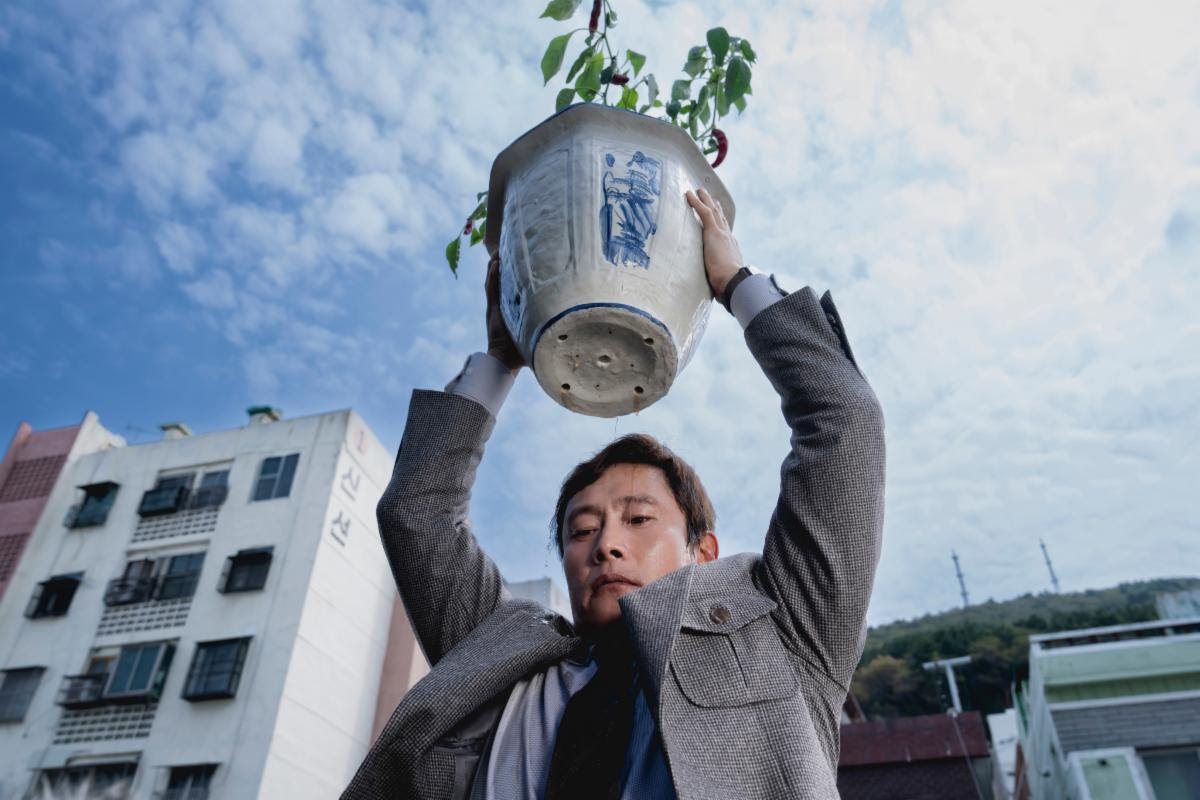No Other Choice
Eojjeol Suga Eopda
VERDICT: A farcical crimefest with a dark side, Park Chan-wook’s ‘No Other Choice’ amplifies the inhumanity of modern industry and the utter ruthlessness of salaried work in an engaging film full of unexpected twists.
The personal cost of corporate downsizing in the midst of a booming economy becomes the satirical target of No Other Choice, a rousing rebuke of a heartless society that pushes loyal workers and family men like its hero to take desperate measures to survive. A change of genre after Korean filmmaker Park Chan-wook’s glossy festival films The Handmaiden and Decision to Leave, it gleefully wallows in the kind of goofy physical comedy that is universally understandable to audiences, while packing an unobtrusive punch with its timely and relatable social message. Its bow in Venice competition should generate enough good word of mouth to give it a boost at the wickets.
The film is dedicated to Costa-Gavras, owner of the rights to the Donald E. Westlake novel The Ax on which the screenplay is based. (Costa-Gavras shot his own version of the novel in 2005 as Le Couperet.) The story of a middle-class manager who is abruptly fired after 25 years of expertise at a paper mill seems particularly well-suited to the Korean setting of luxurious houses in the woods, sterile offices and robotic factories.
It is in one of these sprawling wood-and-glass homes that the yuppie salary-man You Man-su has found happiness with his wife Miri, his son and daughter and two dogs. He has saved up to buy his childhood home (though there is still a mortgage to pay) which looks like a faux hunting lodge behind its walled garden, where the autumn leaves blaze with color around the barbecue and classic music adds to the family harmony. A greenhouse where Dad putters about will become an important part of the plot.
Then one day a pink slip arrives in the mail and the tragedy of Man-su, portrayed with amusing unpredictability by versatile Korean actor Lee Byung-hun (I Saw the Devil; Masquerade), unfolds with dreadful inevitability. After going through the speeded-up anger and denial stages of grief, the You family accepts its fate with humorous resignation. Miri (a highly relatable Son Yejin) takes charge, canceling her tennis lessons and putting her little girl’s upgraded cello lessons (the child is a prodigy) on hold. Expensive BBQ eel is off the menu. Worst of all, they will have to sell their dream house and rent an apartment. Even worse than that, the dogs have to be farmed out to relatives. A complete disaster, recounted to make the audience laugh rather than cry, but the trauma is real.
Little screen time is wasted on Man-su’s fruitless job interviews; despite his competence and experience there are always candidates ranked higher than he is. Eventually it occurs to him that he has “no other choice” than to create his own job opening. How? By bumping off the three men above him on the list for the job he craves at Moon Paper.
His first attempt is too clumsy and naïve to succeed, but the broad comedy of Man-su shakily pointing an old North Korean pistol from his father’s collection at his moving target eases us into the concept of casual murder. While he reconnoiters the man’s house (another oversize wooden monstrosity), it becomes clear that his would-be victim is an older, boozier version of himself, who has let himself go after being unable to find a new job. The presence of his wacky wife complicates the murder considerably, and it all ends in a free-for-all.
Next up is a bright young man working in a shoe store: a hyper-qualified candidate for the Moon Paper job. He has a little daughter just like Man-su, which makes empathy inevitable, but reciting the mantra “I have no choice”, he steels himself to do what he has to do “for his family”. The sad irony is the families of these wretches don’t care about belt-tightening as much as they are distressed at the breakdown in trust and harmony, as shown in several scenes of unreasonable jealousy between husband and wife. Even the kids get dragged into the lawlessness when they are told to lie to the police.
A brilliant ending worthy of Charlie Chaplin’s Modern Times brings the story up-to-date with AI and robot machines that make human workers quite superfluous on the factory floor. But what can we do? There is no other choice.
A visual joy in the film is Kim Woo-hyung’s lush cinematography that emphasizes the intense brightness of nature contrasted with the dark brown interiors of strife and violence. Music choices are loud and bold and surprisingly often classical, particularly one wild fight scene that has the contestants screaming to be heard over a stereo at full blast.
Director: Park Chan-wook
Screenplay: Park Chan-wook, Lee Kyoung.mi, Don McKellar, Jahye Lee
Cast: Lee Byung-hun, Son Ye-jin, Park Hee-soon, Lee Sung-min, Yeom Hye-ran, and Cha Seung-won
Producers: Park Chan-wook, Back Jisun, Michèle Ray Gavras, Alexandre Gavras
Cinematography: Kim Woo-hyung
Editing: Kim Sang-beom, Kim Ho-bin
Production design: Ryu Seong-hie
Costume design: Cho Sang-kyung
Music: Cho Young-wuk
Sound: Kim Suk Won
Production companies: Moho Film, KG Productions
World Sales: CJ ENM
Venue: Venice Film Festival (Competition)
In Korean
139 minutes

